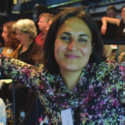I am Nadiye. I am the daughter of a Gastarbeiter (guest worker). My father came at the end of the 60ies to Germany as a minor. He is kind of an archetype of a worker – he has been working in the same factory since 40 years. He has been in the same enterprise and done the same work for decades. He is employed in the tractor industry. My parents are a typical couple from Central Anatolia, who lived in a village and moved to Mannheim in Baden-Württemberg to have a better future for themselves. Like a lot of other people today who come to have more possibilities for themselves and their families.
I am the first daughter of these two people. I was born in Mannheim and went to school there. I graduated from high school there – the first one in our family to do so. Then I studied, because my parents expected that from me, of course. They didn’t want me to grow up as poor and destitute as them. I studied cultural anthropology and migration research and learned a lot: about the history of »guest workers« and refugees, about the politics of the European Union and Germany; about the situation of workers in Germany and how they are treated, and about racism and discrimination.
I started to protest at a quite young age. The first protest I participated in was in 2001, against the war in Iraq. There were demonstrations and I just went there. The next protest I was part of was because of the studies. In Frankfurt am Main where I had been studying, they wanted to introduce tuition fees for everybody, and I knew: If these tuition fees come, again only white, German or European, rich people are able to study, and all of us – migrants or foreigners or people from the Global South – cannot study anymore because it would be too expensive. And that’s why I participated in many protests, but always as an individual. I wasn’t part of a group, because I didn’t really feel good in most of the student organizations. They were very »German«. I couldn’t identify with them.
Later I lived and studied in Turkey – quasi in the origin country of my parents. That was quite good. And then I moved to Berlin to finish my master’s degree. In 2011 a scandal became public: For ten years migrants had been killed by a group of organized Nazis. This is known as NSU scandal. When I saw that in the newspapers I was really shocked: Nazis got money from the German secret agency to have arms and kill people like my father. That made me very angry. I’ve started to organize myself in a group: with migrants and other people who experienced racism.
Ever since I’ve been active in the Bündnis gegen Rassismus (Alliance against racism) and doing actions against racism and the European border regime. Then the Oranienplatz protest camp started, of which I was also part and did many activities. I saw a lot of violence there – of the police, against refugees. All that politicized me a lot.
Now I’m still active in small groups and in the Bündnis gegen Rassismus. I am still politically engaged with the situation of refugees, but I also try to work with families who are affected by racist killings and who still fight for their rights. The fight for rights is very inspiring for me, because we as people who are not seen as Germans here always have to fight for our rights. And this is my connection to the struggles of refugees. I’ve never passed the asylum system, but I know what it means when you do not get everything for free and when you have to fight for your rights.
And this is why I’m always happy when I can collaborate with refugee and migrant women**, because we are facing many forms of discrimination at the same time and we don’t have access to many rights at the same time. For example the women* who were left behind through the NSU killings, they are all widows with Turkish origins who are now without family, without victims’ rights or compensations from the state. And many refugee women* also arrive here without family, or they are separated from their family but still have to take care of them. I think if we tell our stories together, we have more strength to fight for our rights together, and to open this society for our concerns. So that they finally understand that we have always been and will always be here.
Miriam Gutekunst
